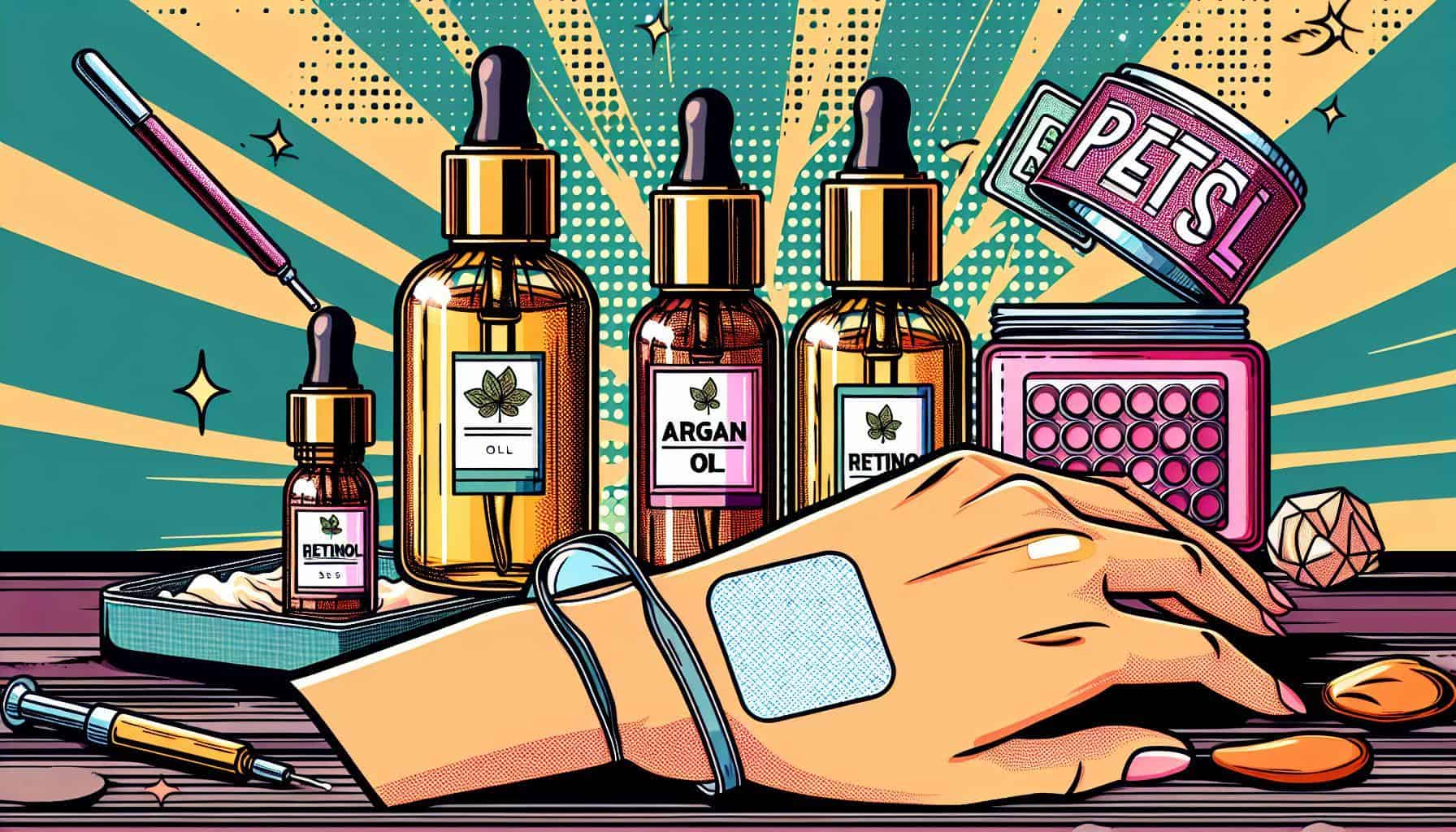Can You Use Argan Oil with Retinol in 2024? Expert Skincare Tips
Wondering if you can use argan oil with retinol in your skincare routine? You’re not alone. This powerful duo could be the key to unlocking your skin’s potential, blending the nourishing benefits of argan oil with the transformative effects of retinol. But before you start layering these products, it’s crucial to understand how they work together to enhance your skin’s health and appearance.
Argan oil, known for its hydrating properties and rich in antioxidants, pairs exceptionally well with retinol, a potent ingredient famous for its anti-aging benefits. This combination could be the answer to achieving that radiant, youthful glow you’ve been aiming for. Let’s dive deeper into how you can incorporate argan oil with retinol into your skincare regime for optimal results.
Can You Use Argan Oil with Retinol?
Wondering if can you use argan oil with retinol in your skincare routine? The answer is a resounding yes. The harmonious combination of argan oil and retinol is not just feasible but highly beneficial for your skin. Argan oil, known for its moisturizing and anti-inflammatory properties, pairs excellently with retinol, a potent anti-aging ingredient.
The Synergy of Argan Oil and Retinol
When incorporating argan oil with retinol, it’s important to understand how these two work together. Retinol accelerates cell turnover, revealing fresher, younger-looking skin underneath. However, this accelerated cell renewal can cause dryness and irritation for some. That’s where argan oil steps in. Rich in linoleic acid and hydrating saturated oils, argan oil can soothe and moisturize the skin, effectively mitigating the potential dryness caused by retinol. Learn more about the unique properties of argan oil here.
Best Practices for Combining Argan Oil with Retinol
To harness the full benefits of using argan oil with retinol, follow these steps:
- Always apply retinol first to clean skin, allowing it to fully absorb.
- After applying retinol, wait a few minutes before applying argan oil to lock in moisture and nourish the skin.
- Use 100% pure, organic, cold-pressed argan oil for the best effects. More about selecting high-quality argan oil can be found here.
Additionally, integrating a sheet mask with hyaluronic acid after applying retinol, and before argan oil, can further boost absorption and effectiveness. While not necessary, it’s an added step for those looking to maximize their skincare results. Detailed insights on optimizing retinol absorption can be explored here.
Incorporating argan oil into your retinol routine not only enriches skin hydration but also amplifies the overall efficacy of your skincare regimen. This powerful duo works together to deliver a radiant, youthful complexion while minimizing potential side effects.
Benefits of Argan Oil
 When exploring whether can you use argan oil with retinol, understanding the benefits of argan oil itself is crucial. Renowned for its versatility, argan oil brings a wealth of benefits to your skincare routine. Let’s delve into the remarkable moisturizing properties and anti-aging effects of argan oil.
When exploring whether can you use argan oil with retinol, understanding the benefits of argan oil itself is crucial. Renowned for its versatility, argan oil brings a wealth of benefits to your skincare routine. Let’s delve into the remarkable moisturizing properties and anti-aging effects of argan oil.
Moisturizing Properties
Argan oil stands out for its exceptional moisturizing abilities. Its high content of oleic acids makes it particularly beneficial for dry skin, providing much-needed hydration and forming a barrier to lock in moisture. This unique property ensures your skin remains hydrated, supple, and more resistant to external elements.
- Deep Hydration: A few drops of argan oil can significantly increase your skin’s hydration levels. Its ability to penetrate deep into the skin ensures that moisture is delivered directly to where it’s needed the most.
- Barrier Formation: By creating a protective barrier, argan oil helps to prevent moisture loss, keeping your skin hydrated for longer periods. This barrier not only retains moisture but also protects against environmental stressors.
For an in-depth look at the moisturizing benefits of argan oil, visit Healthline.
Anti-Aging Effects
Argan oil’s anti-aging properties have been celebrated for centuries. Rich in vitamin E and antioxidants, it fights off the damaging effects of free radicals, which are responsible for skin aging. Incorporating argan oil into your skincare routine can help reduce the appearance of fine lines and wrinkles, promoting a more youthful complexion.
- Antioxidant Power: The antioxidants in argan oil combat oxidative stress and can significantly reduce the visible signs of aging.
- Skin Elasticity: Regular use of argan oil can improve skin’s elasticity, making it look and feel firmer and smoother.
To learn more about argan oil’s anti-aging benefits and how it can rejuvenate your skin, take a look at WebMD.
While argan oil offers impressive moisturizing and anti-aging benefits on its own, combining it with retinol can amplify these effects. The question of “can you use argan oil with retinol” is not only easily answered with a resounding “yes”, but it’s also encouraged for those seeking to elevate their skincare regimen. For practical tips on integrating these powerful ingredients, check out Dermstore’s Guide.
Benefits of Retinol
 When considering your skincare regimen, combining retinol and argan oil might seem like a level-up strategy you hadn’t thought of. If you’re pondering, “can you use argan oil with retinol?”, the answer is a resounding yes. This dynamic duo can provide your skin with a host of benefits, enhancing not only the effectiveness of retinol but also ensuring your skin stays nourished and hydrated. Let’s dive into how retinol, when teamed with argan oil, can transform your skincare routine.
When considering your skincare regimen, combining retinol and argan oil might seem like a level-up strategy you hadn’t thought of. If you’re pondering, “can you use argan oil with retinol?”, the answer is a resounding yes. This dynamic duo can provide your skin with a host of benefits, enhancing not only the effectiveness of retinol but also ensuring your skin stays nourished and hydrated. Let’s dive into how retinol, when teamed with argan oil, can transform your skincare routine.
Reduction of Wrinkles and Fine Lines
Retinol, a derivative of vitamin A, is famed for its anti-aging properties. It works by promoting cell turnover and stimulating collagen production, which in turn helps in reducing the appearance of wrinkles and fine lines. When used with argan oil, the effects can be even more pronounced. Argan oil helps to moisturize the skin and provides a barrier to protect the skin from losing moisture, which is crucial because retinol can sometimes cause dryness. Together, they ensure that while your skin is being renewed, it remains hydrated and less prone to irritation.
For more detailed information on how retinol tackles aging skin, visit Healthline’s guide on retinol.
Improvement of Skin Tone and Texture
Another remarkable benefit of incorporating retinol into your skincare routine is its ability to improve skin tone and texture. It’s not only about diminishing wrinkles; retinol helps in fading dark spots, evening out hyperpigmentation, and smoothing out the skin’s overall texture. The inclusion of argan oil into the mix means that while retinol is hard at work correcting your skin tone, argan oil, rich in vitamin E and fatty acids, helps to soothe and heal the skin. This powerful combination ensures that not only will your skin tone appear more even, but it will also feel softer and more supple.
To explore more about the impact of retinol on skin texture, check out this piece by Dermstore.
Maintaining a balanced approach to using retinol and argan oil together is key. Always start with a lower concentration of retinol to gauge your skin’s tolerance, and don’t forget to apply sunscreen during the day, as retinol can make your skin more susceptible to sunlight. With these precautions in mind, you’re well on your way to reaping the benefits of this powerhouse pairing.
Potential Interactions between Argan Oil and Retinol
Diving into the world of skincare, you may find yourself asking, “can you use argan oil with retinol?” The answer is nuanced, as while these ingredients can be powerful allies for your skin, it’s crucial to understand how they interact. Let’s break down the potential interactions between argan oil and retinol to maximize their benefits and minimize any drawbacks.
Decreased Retinol Efficacy
When considering incorporating argan oil with retinol in your skincare routine, one concern that might arise is the potential for decreased efficacy of retinol. Retinol, highly valued for its cell renewal and collagen-stimulating properties, could have its absorption slightly hampered by the occlusive nature of oils.
However, it’s not all or nothing. The secret lies in timing and application. Experts suggest applying retinol to clean, dry skin followed by a waiting period (typically 20-30 minutes) before adding a layer of argan oil. This method ensures retinol has ample time to penetrate deeply into the skin before the oil creates a protective barrier. For guidance and tips, visiting educational resources like Healthline can provide valuable insights.
Skin Irritation
The dynamic duo of argan oil and retinol may also raise concerns about Skin Irritation. Retinol is known for its potent effects, which, especially for first-time users or those with sensitive skin, can lead to redness, dryness, and peeling.
In contrast, argan oil, rich in soothing vitamin E and fatty acids, can serve as an ally to combat these side effects. By providing a layer of hydration and protection, argan oil not only helps to mitigate irritation but also enhances skin’s resilience. This balancing act is key to harnessing the power of retinol without the uncomfortable backlash. For further reading on managing retinol irritation, websites like Dermstore offer comprehensive advice.
Adding argan oil to your retinol regimen does not merely serve a corrective purpose but also elevates the overall health and radiance of your skin. When applied judiciously, this combination can be transformative, giving you that coveted glow while keeping irritation at bay. To explore more about combining skincare ingredients safely and effectively, turn to sources like Byrdie for dermatologist-approved recommendations.
Embracing both the benefits and potential challenges of using argan oil with retinol requires informed decisions. It’s not just about whether you can combine them, but how you do so, ensuring that each product is given the chance to work its magic on your skin.
Recommendations for Using Argan Oil with Retinol
When diving into the world of skincare, layering different products can sometimes feel like solving a puzzle. Can you use argan oil with retinol? Absolutely, but knowing how to combine them effectively can be game-changing for your skin. Let’s break down the steps to maximize their benefits and ensure a harmonious relationship between these powerhouse ingredients.
Patch Test
Before fully integrating argan oil and retinol into your routine, it’s crucial to conduct a patch test. This precautionary step helps you avoid potential irritation or allergic reactions. Apply a small amount of retinol on one part of your face and argan oil on another. If after 24-48 hours, your skin shows no signs of discomfort, redness, or itchiness, you’re likely in the clear to proceed. Keep in mind, this test is vital as both components can be potent—retinol in altering skin cell behavior and argan oil with its rich concentration of nutrients.
For detailed patch testing guidelines, visit here.
Gradual Introduction
When incorporating argan oil with retinol into your skincare routine, the key is to start slow. Your skin needs time to adjust to potent ingredients like retinol. Begin with applying retinol once or twice a week, gradually increasing frequency as your skin builds tolerance. After applying retinol, wait about 20-30 minutes to allow it to fully absorb into your skin. Then, layer on argan oil to seal in moisture and add an extra barrier of protection. This method helps mitigate potential dryness or peeling from retinol, leveraging argan oil’s hydrating and soothing properties.
Discover detailed steps for layering skincare here.
Consider Alternate Formulations
For those with sensitive skin, the combination of retinol and argan oil might still pose a challenge. In this case, looking into alternative formulations can make a significant difference. Opt for retinol products that boast a time-release formula or are encapsulated, minimizing potential irritation. Similarly, select argan oil that is cold-pressed and pure, ensuring you’re applying the highest quality oil onto your skin. This way, you’re not giving up on the benefits—reduced fine lines, improved hydration, and a glowing complexion—just tweaking how you achieve them.
Learn more about gentle retinol options here.
Boldly combining argan oil with retinol can unlock a pathway to radiant, healthy skin. With these considerations in mind, you’re better positioned to leverage their unique properties to your advantage. Remember, skincare is deeply personal, and what works for one may not work for another. Listen to your skin, adjust as necessary, and you’ll find the perfect balance that lets your natural beauty shine through.
Key Takeaways
- Compatibility of Argan Oil and Retinol: Argan oil and retinol can be used together in a skincare routine, offering a harmonious blend of moisturizing, anti-inflammatory, and anti-aging benefits that enhance skin health and appearance.
- Best Practices for Application: For optimal results, apply retinol first to clean skin and let it absorb fully, then follow with argan oil to lock in moisture. Incorporating a sheet mask with hyaluronic acid between these steps can further boost their effectiveness.
- Benefits of Each Ingredient: Argan oil is renowned for its deep moisturizing properties and ability to form a protective barrier, while retinol is celebrated for reducing wrinkles and improving skin tone and texture. Together, they provide a potent combination for achieving a radiant, youthful complexion.
- Potential Interactions and Solutions: While concerns exist regarding decreased retinol efficacy and skin irritation due to the oil barrier and retinol’s potency, respectively, these can be mitigated by waiting between applications and starting with lower retinol concentrations. High-quality, pure, cold-pressed argan oil is recommended for the best effect.
- Gradual Introduction and Personalization: Start with a low retinol concentration and infrequent application, gradually increasing as your skin tolerates it. Conduct a patch test to minimize risks of irritation, and consider alternate formulations for sensitive skin, adjusting your routine based on personal skin response.
- Skincare is Personal: Always remember that skincare efficacy varies from one individual to another; listening to your skin and customizing your routine accordingly is key to unlocking the full potential of combining argan oil with retinol.
Conclusion
Pairing argan oil with retinol in your skincare routine can unlock the door to radiant, healthy skin. Remember, the key is to start slow, conduct a patch test, and be mindful of how your skin reacts. If you’re someone with sensitive skin, don’t shy away from exploring alternative formulations that might be gentler yet equally effective. By tuning in to your skin’s needs and making adjustments as necessary, you’ll find the perfect balance that works for you. Here’s to embracing the journey towards a glowing complexion with confidence!
Should I Use Argan Oil with Different Skincare Ingredients in 2024?
When considering skincare ingredients in 2024, it’s important to know about argan oil and niacinamide compatibility. While some believe they can be used together, others caution against it. It’s best to consult with a dermatologist to ensure the safety and effectiveness of combining these two ingredients.
Frequently Asked Questions
Can you mix argan oil and retinol?
Yes, argan oil can be layered with retinol. Argan oil’s oleic acid content enhances skin permeability, allowing the oil and other skincare products, including retinol, to penetrate more effectively. This combination can increase the benefits of your skincare routine.
Does argan oil clog pores?
No, argan oil is lightweight and will not clog your pores. Its non-greasy nature makes it suitable for all skin types, including those prone to acne.
Can I put argan oil on top of tretinoin?
Yes, it is safe to use argan oil with tretinoin. Argan oil is non-comedogenic and packed with antioxidants and fatty acids, providing nourishment and hydration to the skin when used alongside tretinoin.
Should you put moisturizer on before or after retinol?
The order depends on your skin type. For dry or sensitive skin, apply retinol after your moisturizer to lessen irritation. For oily or acne-prone skin, putting retinol on before moisturizer allows it to work more effectively by reaching deeper layers of the skin.
What does not mix well with retinol?
Avoid mixing retinol with these ingredients for optimal safety and effectiveness:
- Alpha Hydroxy Acid
- Benzoyl Peroxide
- Vitamin C
-
Salicylic Acid
Also, using a soap-based cleanser with Vitamin C, or combining two products with the same active ingredients, should be avoided.

